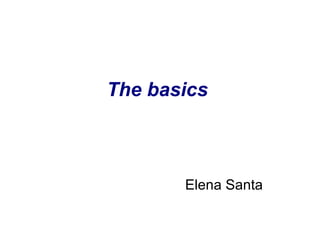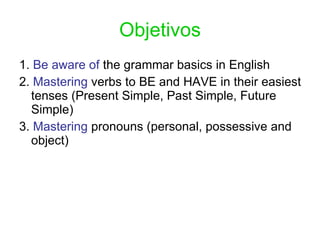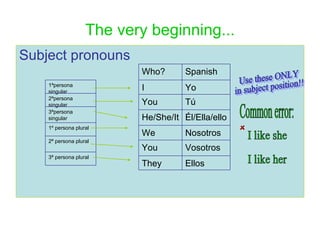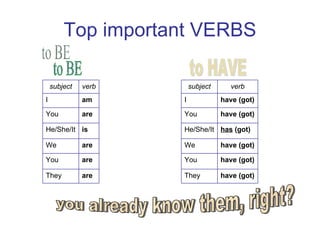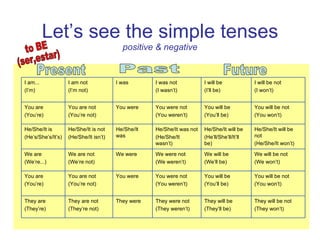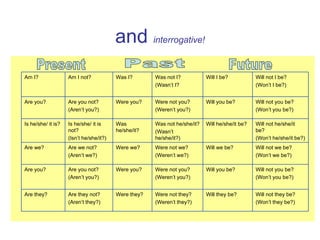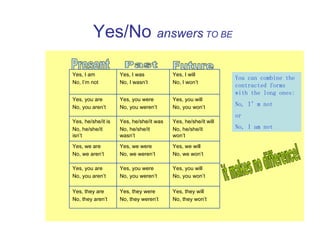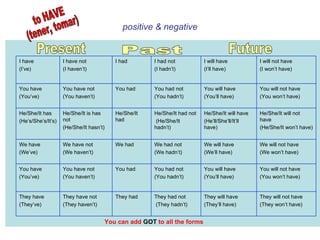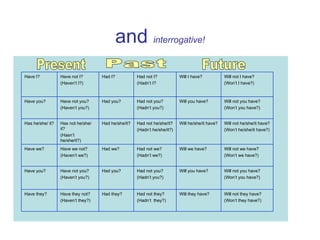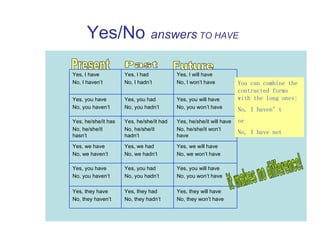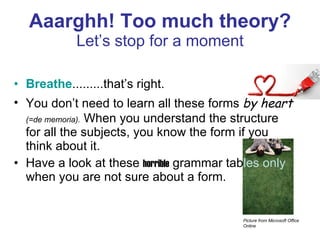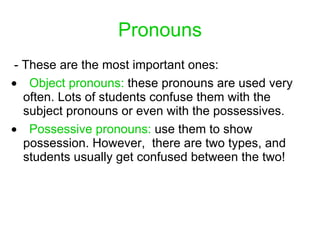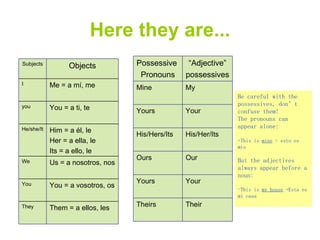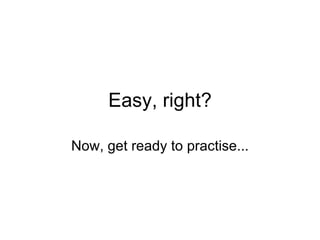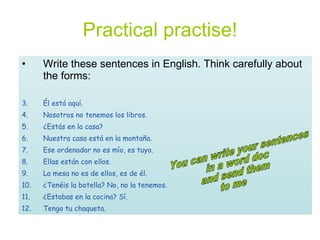First steps in English: The Basics
- 1. The basics Elena Santa
- 2. Destinatarios Lengua extranjera –Inglés 1º de Bachillerato students Picture from Microsoft Office Online
- 3. Objetivos 1. Be aware of the grammar basics in English 2. Mastering verbs to BE and HAVE in their easiest tenses (Present Simple, Past Simple, Future Simple) 3. Mastering pronouns (personal, possessive and object)
- 4. The very beginning... Subject pronouns Use these ONLY in subject position!! I like her I like she Common error: Ellos They Vosotros You Nosotros We Él/Ella/ello He/She/It Tú You Yo I Spanish Who? 3ª persona plural 2ª persona plural 1º persona plural 3ªpersona singular 2ªpersona singular 1ªpersona singular
- 5. Top important VERBS to BE to HAVE you already know them, right? are They are You are We is He/She/It are You am I verb subject have (got) They have (got) You have (got) We has (got) He/She/It have (got) You have (got) I verb subject
- 6. Let’s see the simple tenses positive & negative Present Past Future to BE (ser,estar) They will be not (They won’t) They will be (They’ll be) They were not (They weren’t) They were They are not (They’re not) They are (They’re) You will be not (You won’t) You will be (You’ll be) You were not (You weren’t) You were You are not (You’re not) You are (You’re) We will be not (We won’t) We will be (We’ll be) We were not (We weren’t) We were We are not (We’re not) We are (We’re...) He/She/It will be not (He/She/It won’t) He/She/It will be (He’ll/She’ll/It’ll be) He/She/It was not (He/She/It wasn’t) He/She/It was He/She/It is not (He/She/It isn’t) He/She/It is (He’s/She’s/It’s) You will be not (You won’t) You will be (You’ll be) You were not (You weren’t) You were You are not (You’re not) You are (You’re) I will be not (I won’t) I will be (I’ll be) I was not (I wasn’t) I was I am not (I’m not) I am... (I’m)
- 7. and interrogative! Present Past Future Will not they be? (Won’t they be?) Will they be? Were not they? (Weren’t they?) Were they? Are they not? (Aren’t they?) Are they? Will not you be? (Won’t you be?) Will you be? Were not you? (Weren’t you?) Were you? Are you not? (Aren’t you?) Are you? Will not we be? (Won’t we be?) Will we be? Were not we? (Weren’t we?) Were we? Are we not? (Aren’t we?) Are we? Will not he/she/it be? (Won’t he/she/it be?) Will he/she/it be? Was not he/she/it? (Wasn’t he/she/it?) Was he/she/it? Is he/she/ it is not? (Isn’t he/she/it?) Is he/she/ it is? Will not you be? (Won’t you be?) Will you be? Were not you? (Weren’t you?) Were you? Are you not? (Aren’t you?) Are you? Will not I be? (Won’t I be?) Will I be? Was not I? (Wasn’t I? Was I? Am I not? Am I?
- 8. Yes/No answers TO BE Present Past Future You can combine the contracted forms with the long ones: No, I’m not or No, I am not it makes no difference! Yes, they will No, they won’t Yes, they were No, they weren’t Yes, they are No, they aren’t Yes, you will No, you won’t Yes, you were No, you weren’t Yes, you are No, you aren’t Yes, we will No, we won’t Yes, we were No, we weren’t Yes, we are No, we aren’t Yes, he/she/it will No, he/she/it won’t Yes, he/she/it was No, he/she/it wasn’t Yes, he/she/it is No, he/she/it isn’t Yes, you will No, you won’t Yes, you were No, you weren’t Yes, you are No, you aren’t Yes, I will No, I won’t Yes, I was No, I wasn’t Yes, I am No, I’m not
- 9. positive & negative Present Past Future to HAVE (tener, tomar) You can add GOT to all the forms They will not have (They won’t have) They will have (They’ll have) They had not (They hadn’t) They had They have not (They haven’t) They have (They’ve) You will not have (You won’t have) You will have (You’ll have) You had not (You hadn’t) You had You have not (You haven’t) You have (You’ve) We will not have (We won’t have) We will have (We’ll have) We had not (We hadn’t) We had We have not (We haven’t) We have (We’ve) He/She/It will not have (He/She/It won’t have) He/She/It will have (He’ll/She’ll/It’ll have) He/She/It had not (He/She/It hadn’t) He/She/It had He/She/It is has not (He/She/It hasn’t) He/She/It has (He’s/She’s/It’s) You will not have (You won’t have) You will have (You’ll have) You had not (You hadn’t) You had You have not (You haven’t) You have (You’ve) I will not have (I won’t have) I will have (I’ll have) I had not (I hadn’t) I had I have not (I haven’t) I have (I’ve)
- 10. and interrogative! Present Past Future Will not they have? (Won’t they have?) Will they have? Had not they? (Hadn’t they?) Had they? Have they not? (Haven’t they?) Have they? Will not you have? (Won’t you have?) Will you have? Had not you? (Hadn’t you?) Had you? Have not you? (Haven’t you?) Have you? Will not we have? (Won’t we have?) Will we have? Had not we? (Hadn’t we?) Had we? Have we not? (Haven’t we?) Have we? Will not he/she/it have? (Won’t he/she/it have?) Will he/she/it have? Had not he/she/it? (Hadn’t he/she/it?) Had he/she/it? Has not he/she/ it? (Hasn’t he/she/it?) Has he/she/ it? Will not you have? (Won’t you have?) Will you have? Had not you? (Hadn’t you?) Had you? Have not you? (Haven’t you?) Have you? Will not I have? (Won’t I have?) Will I have? Had not I? (Hadn’t I? Had I? Have not I? (Haven’t I?) Have I?
- 11. Yes/No answers TO HAVE Present Past Future You can combine the contracted forms with the long ones: No, I haven’t or No, I have not it makes no difference! Yes, they will have No, they won’t have Yes, they had No, they hadn’t Yes, they have No, they haven’t Yes, you will have No, you won’t have Yes, you had No, you hadn’t Yes, you have No, you haven’t Yes, we will have No, we won’t have Yes, we had No, we hadn’t Yes, we have No, we haven’t Yes, he/she/it will have No, he/she/it won’t have Yes, he/she/it had No, he/she/it hadn’t Yes, he/she/it has No, he/she/it hasn’t Yes, you will have No, you won’t have Yes, you had No, you hadn’t Yes, you have No, you haven’t Yes, I will have No, I won’t have Yes, I had No, I hadn’t Yes, I have No, I haven’t
- 12. Aaarghh! Too much theory? Let’s stop for a moment Breathe .........that’s right. You don’t need to learn all these forms by heart (=de memoria). When you understand the structure for all the subjects, you know the form if you think about it. Have a look at these horrible grammar tab les only when you are not sure about a form. Picture from Microsoft Office Online
- 13. Pronouns - These are the most important ones : Object pronouns: these pronouns are used very often. Lots of students confuse them with the subject pronouns or even with the possessives. Possessive pronouns: use them to show possession. However, there are two types, and students usually get confused between the two!
- 14. Here they are... Be careful with the possessives, don’t confuse them! The pronouns can appear alone: This is mine = esto es mío But the adjectives always appear before a noun: This is my house =Esta es mi casa They You We He/she/It you I Subjects Them = a ellos, les You = a vosotros, os Us = a nosotros, nos Him = a él, le Her = a ella, le Its = a ello, le You = a ti, te Me = a mí, me Objects Theirs Yours Ours His/Hers/Its Yours Mine Possessive Pronouns Their Your Our His/Her/Its Your My “ Adjective” possessives
- 15. Easy, right? Now, get ready to practise...
- 16. Practical practise! Write these sentences in English. Think carefully about the forms: Él está aquí. Nosotros no tenemos los libros. ¿Estás en la casa? Nuestra casa está en la montaña. Ese ordenador no es mío, es tuyo. Ellas están con ellos. La mesa no es de ellos, es de él. ¿Tenéis la botella? No, no la tenemos. ¿Estabas en la cocina? Sí. Tengo tu chaqueta. You can write your sentences in a word doc and send them to me
